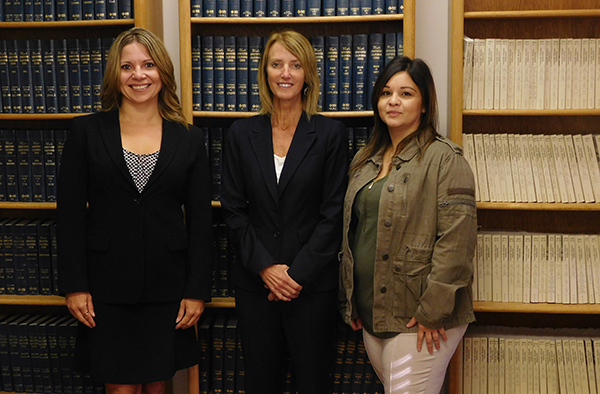Juvenile


The Stanislaus County Public Defender’s Office provides zealous representation of minors who appear in juvenile delinquency court and truancy court, from their first court appearance until the case has been resolved. Our role is to defend the minor against all allegations that have been made against him or her by evaluating the charges, conducting proper investigation, exploring all possible defenses, and vigorously advocating on behalf of the minor in all court proceedings. Our advocacy extends to ensure that the needs of the minor are met through education, guidance, and treatment consistent with the minor’s best interests.
Juvenile courts deal with three types of cases: juvenile dependency, juvenile delinquency, and truancy. Regardless of the type of case, the general question in all juvenile cases is whether it would be in the minor’s best interest for the juvenile court to intervene in his or her life to provide maintenance, support, supervision and services.
Juvenile dependency cases involve allegations against the child’s parent(s) or guardian(s) that they have abused and/or neglected the child. Juvenile delinquency cases involve allegations that the minor has committed a crime. Truancy cases involve allegations that the minor is habitually truant from school.
When a minor is arrested for allegedly committing a crime the arresting officer may decide whether or not to send the minor to the probation department. If the minor is not sent to probation, the minor may be released with just a warning or referred to some type of diversion program. If the minor is sent to probation, the officer must also decide whether to release the minor with a promise to appear or whether to book the minor into juvenile hall.
When the probation department receives a minor’s case from the police the probation officer will decide whether or not to send the case to the District Attorney’s Office. If the case is not sent to the District Attorney, the minor may be released with a warning or referred to a diversion program. If the case is sent to the District Attorney, it will be up to the District Attorney to file formal charges against the minor. When a minor is brought to juvenile hall by the police, the probation officer must also decide whether or not to continue to hold the minor in custody.
When the District Attorney decides to file formal charges against a minor, those charges are contained in a document called a juvenile delinquency petition. Whenever a petition is filed against a minor, the minor has the absolute right to be represented by an attorney (usually an attorney with the Public Defender’s Office). In some cases the District Attorney must decide whether to make a motion to transfer the minor’s case from juvenile court to adult court for prosecution.
If a juvenile delinquency petition is filed against a minor who is in custody at juvenile hall a detention hearing will be held soon after the petition is filed. At the detention hearing the judge must decide whether to continue to hold the minor in custody or to release them. When a minor is released from custody they may be given a general release, placed on house arrest, or placed on electronic monitoring (also known as EMP). A minor released on house arrest or electronic monitoring will be closely supervised by probation while their case is pending; not only will the minor’s movements be restricted, but they will also be required to check in regularly with a probation officer.
The purpose of the pretrial hearing is to see whether the charges contained in the petition can be settled prior to Jurisdictional Hearing (a.k.a trial). The prosecuting attorney may allow a minor to admit to less serious charges and/or to dismiss charges against the minor in exchange for the minor giving up his or her right to have a Jurisdictional Hearing. As in adult court, a minor is presumed to be innocent of the charges contained in the petition and has the absolute right to require the District Attorney to prove that the charges in the petition are true beyond a reasonable doubt at Jurisdictional Hearing.
A trial in juvenile court is known as a jurisdictional hearing. Unlike in adult court, a jury does not decide the minor’s guilt or innocence. Instead, all jurisdictional hearings in juvenile cases are court trials, where the judge alone determines the outcome of the case. As in adult trials, at Jurisdictional Hearings witnesses are questioned in court, evidence is presented, and the burden is on the District Attorney to prove beyond a reasonable doubt that the minor committed the crimes alleged in the petition. If none of the charge(s) in the petition are proved to be true, the petition is dismissed and the case ends.
If the minor admits charge(s) at a pretrial hearing, or the District Attorney proves at least one of the charges in petition to be true following a jurisdictional hearing, a disposition hearing will then be held. The purpose of the disposition hearing is similar to sentencing in adult court. Prior to the disposition hearing probation will prepare a disposition report. The disposition report will contain information about the minor, including the minor’s family situation, his or her educational background, current mental/physical health, and other information relevant to the minor’s rehabilitation. This report will be provided to the minor’s attorney, the District Attorney and the judge. At the disposition hearing the judge must decide whether the minor will serve time in juvenile hall and/or be placed on a form of alternative detention (i.e. house arrest or EMP), which type of probation the minor will be placed on, and in some cases whether to send the minor to out-of-home placement. When a minor has been found to have committed an offense listed in Welfare and Institutions Code section 707(b), the judge has the additional option of committing the minor to DJJ (formerly known as CYA).
When a minor is placed on probation they are generally allowed to continue residing with their families under the supervision of a probation officer. A variety of probation conditions may be imposed, including but not limited to community service hours, counseling/therapy, payment of restitution, and drug testing. When the judge is satisfied that the minor has been rehabilitated the minor’s probation will be dismissed. Although probation is typically dismissed much sooner, a minor may legally remain on juvenile probation until age 21.
When a minor is sent to out-of-home placement the minor is removed from the home of the parent(s)/guardian(s) and is ordered to complete a program before being allowed to return to his or her family. Programs vary in size, location, and objectives. Out-of-home placements include juvenile camps, group homes, and residential treatment facilities. Although programs vary in length, the average placement will take a minor approximately 12 months to complete. The facility that is chosen for a minor must address all relevant issues and rehabilitative goals of the minor.
The Public Defender’s Office appears at all court dates for minors who are sent to placement. If there are any concerns about a particular minor, the minor’s placement, or treatment in placement, the attorney will address these concerns with the court.
In certain cases, the judge has the authority to commit the minor to the Department of Juvenile Justice (formerly known as the California Youth Authority). A DJJ commitment is similar to a state prison commitment for adults. The length of commitment to DJJ will vary depending upon the specific offense(s) that the minor has committed and how well the minor performs while at DJJ. Except in very rare cases, a minor may only be confined at DJJ until age 25.
When a minor is discharged from DJJ he or she is brought before the juvenile court for reentry into the community. The juvenile court typically modifies previous orders and places the minor on standard probation. An attorney with the Public Defender’s Office is assigned to handle all such cases.
Yes. Since the passage of Proposition 57, in certain cases, the District Attorney may make a motion to transfer a minor’s case from juvenile court to adult court for prosecution.
Minors whom habitually miss school are initially handled by the school district, including being brought before a school attendance review board. If those efforts fail the minor may have a petition filed against them for truancy. The minor has a right to a court trial to determine whether they have been truant. A minor can be deemed a truant by failing to comply with various attendance demands of the school and/or the School Attendance Review Board (SARB).
If a minor is placed on truancy probation, conditions of that probation might include: community service, a fine, a driving license privilege suspension, and participation in counseling Minors who do well can potentially have their cases dismissed in a period of six months.
No. A juvenile finding is not a conviction, it is an adjudication; therefore, the minor generally does not have to disclose a juvenile finding if asked if he or she has ever been convicted of a crime.
Although juvenile adjudications generally are not considered criminal convictions, under current law, certain juvenile adjudications may nevertheless constitute a “strike” under California’s Three Strikes Law.
Generally, juvenile proceedings are strictly confidential. In most cases court proceedings are closed to the general public, except for those cases filed pursuant to section 707(b) of the Welfare and Institutions Code. In addition, records of juvenile court proceedings are also confidential. Although the minor, the minor’s parents, the minor’s attorneys, and representatives from certain agencies have the right to inspect juvenile case files, other parties must file a motion with the juvenile court in order to inspect and/or receive such records. Juvenile case files remain strictly confidential unless the court finds good cause for the file, or parts thereof, to be disclosed.
The Public Defender’s Office strongly urges all eligible minors to pursue getting their juvenile records sealed. In some cases juvenile records will be automatically sealed by the court pursuant to Welfare and Institutions Code section 786. In other cases the minor will have to petition the court to have his or her juvenile records sealed.
You can apply to have your records sealed if:
- You have reached your 18th birthday or it has been at least 5 years since the probation was terminated or your last arrest;
- As an adult you have not been convicted of a felony or a misdemeanor involving “moral turpitude.” You are not currently on probation;
- You have no juvenile findings against you for felony offenses listed in Welfare and Institutions Code section 707(b) after you reached age 14
Once the court has ordered a minor’s record sealed, the proceedings in the case shall be deemed to have never occurred and the minor may legally declare that they have never been arrested and no finding has ever been made against them. However, please note that law enforcement agencies and branches of the military continue to have access to criminal history records, including arrests, even after a record has been ordered sealed.





